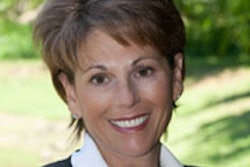
A bill that would allow Georgia dental hygienists to provide preventive care without the direct supervision of a dentist appears headed for legislative approval, after it was approved February 16 by the state's House of Representative's Health and Human Services Committee.
The bill, HB 684, received a boost from the Federal Trade Commission (FTC), which stated on February 1 that the measure would "particularly benefit underserved populations with limited access to preventive care."
The bill would permit dental hygienists to provide care in "safety-net" settings, including nonprofit clinics, healthcare facilities, long-term care facilities, school-based programs, or at other facilities approved by the Georgia Board of Dentistry. Additionally, the bill would allow dental hygienists to provide dental screenings in any setting without direct supervision. The bill now goes to the House Rules Committee.
 Frank Capaldo, executive director, Georgia Dental Association. Image courtesy of the GDA.
Frank Capaldo, executive director, Georgia Dental Association. Image courtesy of the GDA.The revised bill bars hygienists from providing care more than 100 miles from the authorizing dentist's office, which would have to be located in Georgia. Dentists would also be limited in the number of hygienists they could authorize to work independently, and dentists would have the right to insist on examining particular patients before the hygienist did the work.
Some lawmakers were concerned that dental "mills" in other states would operate in Georgia, which is the reason the authorizing dental office must be in Georgia.
Cultural issues also affect access to care, according to the Georgia Dental Association (GDA).
"The Georgia Dental Association accepts the amendments in the bill, but also believes that barriers to care such as reliable transportation, language barriers, and a lack of understanding as to the importance of oral health and its correlation to one's overall well-being are preventing people from receiving appropriate dental care," stated GDA Executive Director Frank Capaldo in an email to DrBicuspid.com.
FTC issues strong support
In its February 1 statement, the FTC also said the bill would save money for government programs such as Medicaid.
"Elimination of the direct supervision requirement and the likely increase in competition and access arising from HB 684 could reduce the costs of treatment for patients and lead to savings for government benefit programs," the FTC noted.
This is not the first time that the FTC has taken action to curb restrictions on dental hygienists by state dental boards. In 2011, the FTC staff urged the Maine Board of Dental Examiners against rules to restrict the scope of practice of independent practice dental hygienists (IPDHs) from participating in a project to improve access to care in underserved areas of the state, by preventing them from taking certain x-rays without a dentist present. A law was subsequently passed which expanded the duties of IPDHs, allowing them to take a broad range of x-rays in underserved areas of the state.
In 2003, the FTC sued the South Carolina Board of Dentistry, saying the board had illegally restricted the ability of dental hygienists to provide preventive dental services in schools without a prior examination by a dentist. The FTC accused the board of "unreasonably restraining competition and depriving thousands of economically disadvantaged schoolchildren of needed dental care, with no justification." The board ultimately dropped the requirement.
“HB 684 has the potential not only to improve oral health, but also to contribute more generally to Georgians' physical health and well-being.”
Georgia's direct supervision requirement restricts the conditions and locations in which hygienists may provide services by limiting their practice to facilities where a dentist is physically present, the FTC said.
"Accordingly, the potential negative effect of a direct supervision requirement is greatest precisely where there is the most need for dental health professionals -- underserved communities in dental health professional shortage areas, where dentists are often scarce or unavailable," according to a January 29 FTC letter to Georgia state Sen. Valencia Seay (D-District 34).
Most states require only general supervision, which requires a dentist to authorize care by hygienists, but does not require the dentist to be physically present, the FTC noted.
"Greater competition may, in turn, enhance access to affordable preventive services, mitigate the broader health consequences of dentist shortages, and facilitate the development of innovative models for delivering care," the FTC wrote. "Indeed, dental hygienists are well-positioned to alleviate limited access to preventive dental care arising from dentist shortages because they outnumber dentists by approximately 20%."
Some 148 Georgia locations have been designated as federal dental care health professional shortage areas (15% of the population), the FTC said, and only 27% of those who need to see a dentist can get oral care.
"Elimination of the direct supervision requirement will help alleviate some of these dental care shortages, and facilitate greater competition, which could reduce costs and prices," the FTC noted.
Not requiring the physical presence of dentists would save money, because it would prevent paying for the dentists' services, while cutting patients' transportation costs, the commission said. The change could also reduce treatment costs and save money for government benefit programs.
The Institute of Medicine recommends that state legislatures increase access to basic oral healthcare by amending dental practice acts to allow allied dental professionals such as hygienists to work to the full extent of their education and training "in a variety of settings under evidence-supported supervision levels," according to a 2011 report.
Hygienist advantages
Georgia is one of the last five states in the country that does not allow dental hygienists to provide services to the public without the direct supervision of a dentist, including head and neck exams for the early detection of oral cancer, according to the Georgia Dental Hygienists' Association (GDHA).
In 2009, 60,000 dental-related hospital emergency room visits cost the state $25 million, the GDHA said.
"HB 684 has the potential not only to improve oral health, but also to contribute more generally to Georgians' physical health and well-being," the FTC concluded.



















